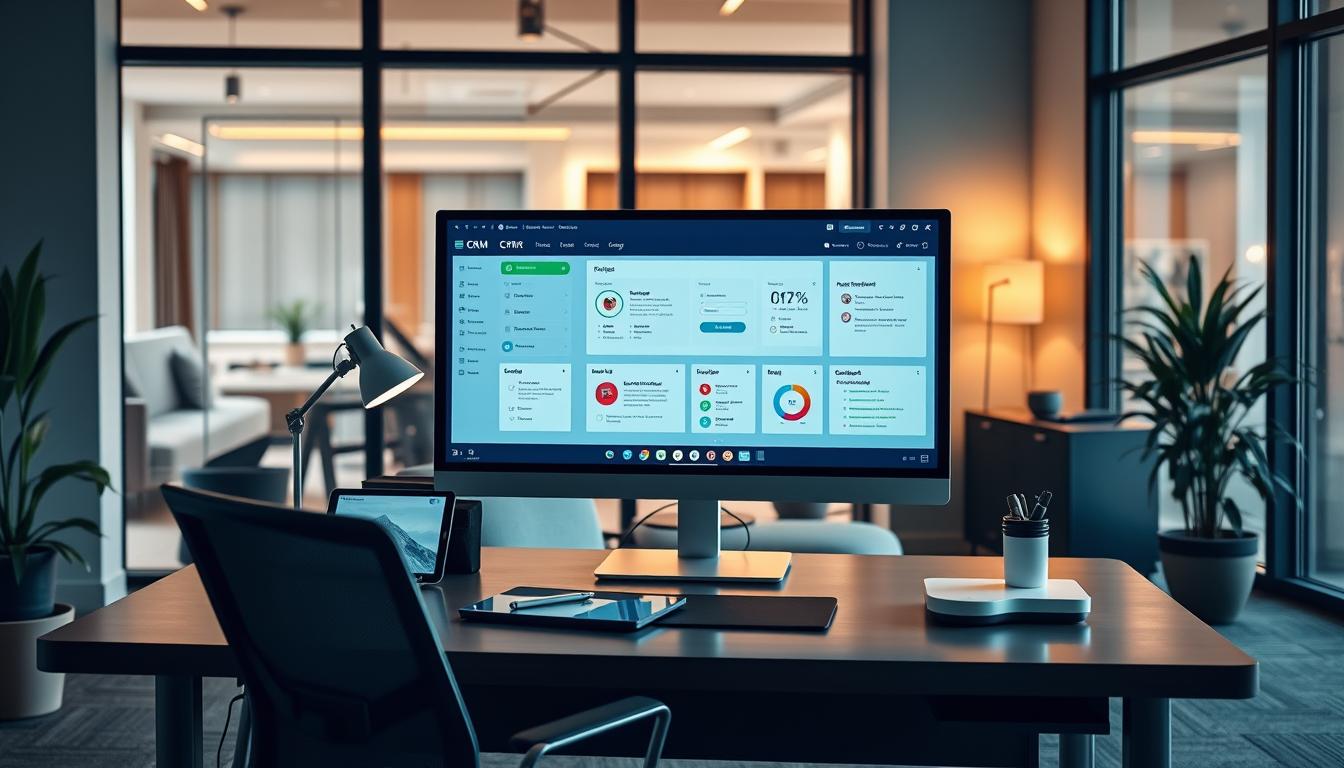In today’s fast-paced business world, managing customer relationships is key to success. Did you know that using good customer relationship management can really boost sales and make customers happier?
Finding the right CRM solutions can be tough. With so many choices, it’s hard to pick the ones that fit your business. We’re here to help you find the best CRM software that matches your goals.
We want to help you understand the different CRM systems and tools. This way, your business can make smart choices. Whether you’re small or big, the right CRM can make your customer interactions better and help your business grow.
Key Takeaways
- Understanding the importance of CRM solutions in business
- Identifying key features of effective CRM software
- Exploring the benefits of implementing CRM systems
- Guidance on selecting the best CRM tools for your business needs
- Insights into how CRM solutions can drive business growth
Understanding CRM Systems
For businesses wanting to better their customer ties and make things run smoother, knowing CRM systems is key. First off, we need to get what CRM systems do and how they help companies.
What is a CRM System?
A CRM system, or Customer Relationship Management system, is tech that helps businesses manage their customer interactions. It’s all about using software to organize and automate sales, marketing, and customer service tasks.
Basics of CRM
CRM software helps teams manage their work on Kanban boards, track tasks, and talk to clients and prospects. This all-around approach makes businesses run better, boosts customer happiness, and helps them grow.
With a CRM system, companies can improve customer relationships by giving a more tailored experience. For example, CRM systems help track customer interactions across different platforms. This ensures customer questions get answered fast and well.
CRM systems also let businesses automate routine tasks, saving time for more important work. This boosts efficiency and lets companies adapt fast to market changes.
To wrap it up, understanding CRM systems is vital for businesses wanting to strengthen their customer ties and work better. By using CRM tech, companies can stay ahead in today’s quick business world.
Key Features of Effective CRM Tools
Effective CRM tools have features that boost customer relationships and business productivity. These features make processes smoother, give better insights into customers, and help sales grow.
Some of the key features include:
- Contact Management: This feature lets businesses keep customer data in one place. It makes it easy to find and manage customer info.
- Sales Automation: Sales automation makes sales work easier by doing routine tasks. This lets sales teams focus on important tasks.
- Reporting and Analytics: Reporting and analytics give insights into customer behavior and sales. This helps businesses make smart decisions.
Contact Management
Contact management is key in CRM tools. It helps businesses keep customer data organized. This improves customer service, makes marketing more personal, and strengthens customer ties.
Sales Automation
Sales automation is another important feature. It makes sales work more efficient. Sales teams can then focus on building relationships and closing deals.
Reporting and Analytics
Reporting and analytics are crucial. They give businesses insights into customer behavior and sales. This helps identify trends, improve sales strategies, and boost customer happiness.
By using these features, CRM tools help businesses meet their goals. This leads to growth and more profit.
Types of CRM Systems Available
CRM applications vary to meet different business needs. It’s important to know these types to pick the best CRM for your business.
Operational CRM
Operational CRM automates customer-facing tasks like sales, marketing, and service. It makes these processes smoother, improving how businesses interact with customers. For example, sales automation helps manage leads better, and marketing automation makes customer messages more personal.
Analytical CRM
Analytical CRM analyzes customer data to help make business decisions. It uses tools to spot trends and customer behaviors. This way, businesses can create better marketing plans and boost customer happiness.
Collaborative CRM
Collaborative CRM makes teams work better by sharing customer info. It lets all departments see the same customer data. This leads to faster responses and better customer service through collaboration tools in CRM systems.
Industry-Specific CRMs
Industry-specific CRMs are made for certain sectors. For instance, healthcare CRMs focus on patient care, while retail CRMs help with loyalty programs. Using a CRM made for your industry can offer features that really help your business.
In summary, there are many CRM systems out there. Whether you need operational, analytical, collaborative, or industry-specific, the right CRM can greatly improve your business and customer relationships.
Benefits of Using CRM Systems
CRM systems bring many benefits to customer relationships and business efficiency. They automate tasks, centralize customer data, and offer insights for better email marketing. This can greatly change how a business operates.
Enhanced Customer Relationships
One key benefit of CRM systems is improving customer relationships. They give a clear view of customer interactions. This helps businesses understand what their customers want and need.
CRM systems track interactions across social media, email, and phone calls. This gives businesses a full picture of customer behavior. It helps them make smart decisions.
Improved Efficiency and Productivity
CRM systems also boost efficiency and productivity. They automate tasks and make sales processes smoother. This lets sales teams focus on what really matters.
By automating tasks like data entry and emails, CRM systems free up sales teams. They can then be more productive. CRM systems also show sales performance in real-time. This helps businesses see where they can get better.
Data-Driven Decision-Making
Another big benefit of CRM solutions is the insights they offer. They help businesses understand customer behavior and sales performance. This information guides sales and marketing strategies.
CRM systems have tools for reporting and analytics. They help track important metrics like sales revenue and customer value. This data helps businesses make smart choices and improve their strategies.
| CRM Benefits | Description | Impact on Business |
|---|---|---|
| Enhanced Customer Relationships | Unified view of customer interactions, personalized experiences | Improved customer satisfaction and loyalty |
| Improved Efficiency and Productivity | Automation of routine tasks, streamlined sales processes | Increased sales productivity, reduced administrative burden |
| Data-Driven Decision-Making | Insights into customer behavior and sales performance | Informed sales and marketing strategies, optimized business performance |
Top CRM Systems in 2023
Businesses are looking to improve their customer engagement in 2023. Top CRM systems like Salesforce, HubSpot, and Zoho CRM are leading the way. They offer comprehensive and integrated solutions.
These CRM systems are known for their innovative features and user-friendly interfaces. They cater to diverse business needs. Let’s explore what each of these top CRM systems offers.
Salesforce: A Leader in the Market
Salesforce is a dominant force in the CRM market. It has a wide range of tools and features for sales, marketing, and customer service. Its platform is highly customizable, making it suitable for businesses of all sizes.
Key Features: Advanced sales automation, comprehensive analytics, and seamless integration with third-party applications.
HubSpot: User-Friendly and Feature-Rich
HubSpot CRM is known for its ease of use and rich feature set. It supports inbound marketing, sales, and customer service. It’s great for businesses that need a CRM that integrates well with marketing tools.
Key Features: User-friendly interface, robust marketing tools, and detailed reporting capabilities.
Zoho CRM: Cost-Effective Solution
Zoho CRM is appreciated for its cost-effectiveness and flexibility. It offers a range of features for different business needs. It’s an excellent choice for businesses looking for an affordable and powerful CRM.
Key Features: Customizable modules, automation capabilities, and integration with Zoho’s suite of productivity tools.
| CRM System | Key Features | Notable Strengths |
|---|---|---|
| Salesforce | Sales automation, analytics, integrations | Highly customizable, comprehensive features |
| HubSpot | Marketing tools, user-friendly interface, reporting | Inbound marketing focus, ease of use |
| Zoho CRM | Customizable modules, automation, integration with Zoho tools | Cost-effective, flexible |
Comparison of CRM Tools
The market has many CRM tools, each with its own features, prices, and ease of use. It’s important to look at several key factors when comparing CRM tools. These factors can greatly affect your business.
Pricing Structures and Plans
CRM prices vary a lot, from free to over $70 per user per month. The price depends on the features, number of users, and customer support level.
We’ve made a table to show the prices of popular CRM systems:
| CRM System | Basic Plan | Premium Plan | Enterprise Plan |
|---|---|---|---|
| Salesforce | $25/user/month | $75/user/month | $150/user/month |
| HubSpot | Free | $40/user/month | $120/user/month |
| Zoho CRM | $12/user/month | $20/user/month | $45/user/month |
Usability and Learning Curve
The ease of use and learning curve of a CRM system are key. Intuitive interfaces and good training can help employees learn fast.
HubSpot is known for being easy to use, helping new users adapt quickly. Salesforce, on the other hand, offers lots of training to help users learn its features.
Integration with Other Software
Being able to integrate with other software is crucial. Seamless integrations can automate tasks, keep data consistent, and give a full view of customer interactions.
Most CRM systems work well with popular tools like email clients and marketing software. For example, Zoho CRM works well with Google Workspace and Microsoft Office.
When choosing a CRM tool, check its integration capabilities. Make sure it fits with your current technology.
How to Choose the Right CRM for Your Business
Choosing the right CRM for your business is a big decision. You need to think about what your business needs, if the CRM can grow with you, and if your team will use it. These factors are key to making the right choice.
Assessing Your Business Needs
First, figure out what you need from a CRM. Think about the customer interactions you want to manage, how many customers you have, and what features are important to you. Key considerations include contact management, sales automation, and reporting capabilities. Knowing your needs helps you find a CRM that fits your business goals.
Considering Scalability
Scalability is also important. Your CRM should grow with your business. A scalable CRM system helps you manage customer relationships as your business grows. Look for a CRM that can adapt to your needs, whether you’re getting bigger or smaller.
Getting Team Buy-In
It’s important to get your team to use the CRM. Involve them in choosing and make sure they see the benefits. Good training and support help your team use the CRM to its fullest. By working with your team, you can make the transition to the new CRM smoother.
Here’s a comparison of key CRM features to consider:
| CRM Feature | Description | Importance Level |
|---|---|---|
| Contact Management | Organizes customer and prospect information | High |
| Sales Automation | Streamlines sales processes and tasks | Medium |
| Reporting and Analytics | Provides insights into customer behavior and sales performance | High |
| Integration Capabilities | Ability to integrate with other business applications | Medium |
Tips for Implementing a CRM System
A successful CRM system can change how businesses talk to customers and handle data. To make this happen, we need to focus on a few key strategies. These ensure our CRM system works well across the whole organization.
Training Your Team
Training is key for CRM success. Our team must know how to use the CRM and how it fits into our business plan. We need training that covers everything from basic use to advanced features.
To make training better, we should:
- Make training fit different groups in our organization.
- Offer ongoing support and resources for CRM skills.
- Listen to user feedback to improve both the CRM and our training.
Setting Clear Goals
Clear goals are vital for aligning our CRM with our business aims. We must decide what we want to achieve, like better customer satisfaction or more sales.
To set good goals, we should:
- Choose key performance indicators (KPIs) to measure CRM success.
- Set realistic targets for these KPIs based on our business and past data.
- Keep reviewing and updating our goals to stay on track.
Regularly Reviewing Performance
It’s important to regularly check how our CRM is doing. We need to watch our KPIs, analyze data, and make changes when needed.
To review performance well, we can use a table to track important metrics:
| Metric | Target | Current Performance |
|---|---|---|
| Customer Satisfaction | 85% | 80% |
| Sales Growth | 10% | 8% |
| Customer Retention | 75% | 72% |
By regularly checking our performance and making smart decisions, we can make our CRM better for our business goals.
Common Misconceptions About CRM Systems
CRM systems are becoming more important, but they’re surrounded by myths. These myths can confuse people about what CRM systems can do. They might even stop businesses from using them well.
CRM is Just for Sales Teams
Many think CRM systems are only for sales teams. But, they help many parts of a company, like marketing and customer service too. CRM systems bring together customer data, helping teams work better together. This makes customers happier and helps the business grow.
CRM Implementation is Too Complex
Some believe setting up a CRM system is too hard and takes too long. While it does need some planning, many CRMs are easy to use. They also offer lots of help and training to make the transition smooth.
All CRMs Offer the Same Features
Some think all CRM systems are the same. But, each CRM is made for different business needs. They have unique features that can be adjusted to fit what a business needs. It’s important to know these differences when choosing a CRM.
By clearing up these myths, businesses can see the real value of CRM systems. They can use CRM systems to grow, improve customer relationships, and work more efficiently.
The Role of CRM in Customer Retention
Keeping customers is key to a business’s success. CRM systems play a big role in this. They help businesses keep their customers.
Building Long-Term Relationships
CRM systems help businesses build long-term relationships with customers. They give a full view of how customers interact. This lets businesses know what customers need and offer services that fit.
Keeping a detailed record of customer interactions helps businesses spot patterns and preferences. This way, they can give personalized experiences that build loyalty.
Personalization and Customer Experience
Personalization is crucial for keeping customers. CRM systems make it possible by analyzing customer data for targeted marketing. This way, businesses can offer tailored experiences that meet customer needs.
CRM systems also make customer service better. They ensure quick and efficient answers to customer questions. This boosts satisfaction and makes for a better customer experience.
Using a CRM system brings many benefits, like better customer retention. As we see more of what CRM systems can do, it’s clear they’re vital for keeping customers.
Future Trends in CRM Technology
The CRM world is changing fast, thanks to new tech. Businesses are getting better at meeting customer needs. CRM systems are getting smarter, using new tech to help grow businesses and improve customer relationships.
AI and Machine Learning Integration
AI and Machine Learning are big in CRM now. They help CRM systems understand and predict what customers want. AI-powered CRMs can do routine tasks, so sales teams can focus on important work.
AI chatbots can answer customer questions anytime. They make sure customers get help fast. Machine Learning finds patterns in data, helping businesses meet customer needs better.
Mobile CRM Accessibility
Mobile CRM is key now that everyone uses phones. Mobile CRM lets sales teams work with customer data anywhere. This keeps them productive and ready to help customers.
Mobile CRM apps make it easy to stay in touch with customers. This boosts satisfaction and sales.
Enhanced Customer Insights and Analytics
CRM tech is also getting better at understanding customers. Modern CRM systems have tools for deep customer insights.
These insights help businesses create better marketing and improve customer interactions. By using CRM data, businesses can make smart choices and grow sales.
| Trend | Description | Benefits |
|---|---|---|
| AI and Machine Learning Integration | Analyzes customer data, predicts behavior, and personalizes interactions | Automates routine tasks, improves customer experience |
| Mobile CRM Accessibility | Enables access to customer data and sales management on mobile devices | Enhances productivity, improves customer responsiveness |
| Enhanced Customer Insights and Analytics | Provides deep insights into customer behavior and preferences | Informs business decisions, drives sales growth |
Conclusion: Finding Your Ideal CRM System
Finding the right CRM is key to better customer relationships and business growth. We’ve looked at CRM systems’ benefits, features, and best practices in this article.
Recap of Key Points
Understanding your business needs is the first step in choosing a CRM. We talked about CRM best practices like managing data and automating sales. We also covered the different types of CRM systems.
The CRM selection process requires looking at scalability, usability, and integration. By considering these, you can find a CRM that fits your business needs and improves customer engagement.
Encouragement to Explore Options
We suggest checking out the many CRM options out there. Whether you’re small or large, there’s a CRM for you. Using CRM best practices and the right CRM can make your sales smoother, increase customer happiness, and grow your business.
To help you decide, we’ve made a table comparing top CRM systems in 2023:
| CRM System | Pricing | Key Features | Scalability |
|---|---|---|---|
| Salesforce | $25/user/month | Sales automation, marketing automation, customer service | Highly scalable |
| HubSpot | $40/user/month | Contact management, sales automation, reporting analytics | Scalable |
| Zoho CRM | $12/user/month | Contact management, sales automation, marketing automation | Scalable |
By looking at your business needs and CRM features, you can pick the best CRM for your business. We hope this guide has given you useful insights into CRM systems and CRM implementation best practices.
Discover the Best CRM Systems and Tools for Your Needs
In today’s fast-paced business world, managing customer relationships is key to success. Did you know that businesses using the right CRM solutions can increase sales by up to 29%? This shows how important it is to pick the best CRM software for your business.
We will look at the top CRM systems and tools out there. We’ll dive into their features and benefits. This way, you can choose the right CRM that fits your business goals.
Key Takeaways
- Understanding the importance of CRM solutions for business success
- Identifying the key features of top CRM software
- Learning how to choose the right CRM for your business needs
- Discovering the benefits of implementing CRM systems
- Exploring the impact of CRM on sales and customer relationships
Understanding CRM Systems
To manage customer relationships well, businesses need to know what CRM systems are. CRM stands for Customer Relationship Management. It’s a technology that helps companies handle their customer interactions.
What is a CRM System?
A CRM system is a tool for managing customer data and interactions in one place. It includes contact management. Businesses can store customer info, interaction history, and preferences here.
With this info, businesses can make their marketing better, improve customer service, and boost sales.
Basics of CRM
CRM basics involve using software to make sales, marketing, and customer service easier. CRM software helps business owners and their teams manage process pipelines on Kanban boards. They can track tasks and talk to clients and potential customers.
This makes work more efficient and ensures customer interactions are on time and relevant.
By learning about CRM and using a CRM system, businesses can greatly improve their customer relationships. It’s about using technology to make business more focused on the customer.
Key Features of Effective CRM Tools
Effective CRM tools are key to any successful customer relationship strategy. They offer features that boost customer relationships and business productivity.
Contact Management
Contact management is a basic feature of CRM tools. It lets businesses keep customer data in one place. This makes it easy to find customer info, track interactions, and tailor experiences.
Sales Automation
Sales automation is crucial for making sales processes smoother. It cuts down on manual work and boosts efficiency. This way, businesses can spend more time on important tasks like building relationships and closing deals.
Reporting and Analytics
Reporting and analytics give insights into customer behavior and sales performance. They help businesses make informed decisions, spot trends, and fine-tune their sales plans.
To show the importance of CRM tool features, let’s look at a comparison:
| Feature | Description | Benefits |
|---|---|---|
| Contact Management | Centralized customer database | Easy access to customer information, personalized experiences |
| Sales Automation | Streamlined sales processes | Increased efficiency, reduced manual tasks |
| Reporting and Analytics | Insights into customer behavior and sales performance | Data-driven decisions, optimized sales strategies |
By using these features, businesses can better their customer relationships, sales, and growth. When picking a CRM tool, think about what’s most important for your business.
Types of CRM Systems Available
It’s important for businesses to know about the different CRM systems. This is key for picking the right CRM tools for small businesses. There are many CRM applications out there, each for different business needs.
Operational CRM
Operational CRM automates tasks like sales, marketing, and customer service. It aims to make customer interactions better and business operations smoother. By doing routine tasks automatically, it helps businesses work more efficiently and save money.
Analytical CRM
Analytical CRM analyzes customer data to understand their behavior and preferences. It gives businesses the tools to make smart decisions with detailed analytics and reports. This type of CRM is vital for businesses wanting to know their customers better and create targeted marketing.
Collaborative CRM
Collaborative CRM helps teams work together by sharing customer information. It ensures everyone is on the same page and working towards the same goals. This type of CRM boosts business performance by improving communication and data sharing.
Industry-Specific CRMs
Industry-specific CRMs are made for businesses in certain sectors. They address the unique challenges and needs of industries like healthcare, finance, and retail. These CRMs have features tailored to each industry, helping businesses work better in their markets.
In summary, there are many CRM systems for different business needs. From automating tasks to analyzing data and improving teamwork, each type has its purpose. By understanding these, businesses can pick the CRM software reviews that fit their needs best. This leads to better customer relationships and business success.
Benefits of Using CRM Systems
CRM systems offer many advantages, making customer relationships better and work processes smoother. They help automate tasks, keep all customer data in one place, and make team work better.
Enhanced Customer Relationships
CRM systems give a clear view of how customers interact with a business. This helps build stronger, more personal connections with customers. Here’s how:
- Tracking customer interactions across multiple channels
- Analyzing customer behavior and preferences
- Personalizing marketing efforts and customer communications
A CRM expert once said,
“A CRM system is not just a tool, it’s a strategy that helps businesses understand their customers better and serve them more effectively.”
Improved Efficiency and Productivity
CRM systems make work more efficient and productive by automating tasks and making sales processes smoother. This lets businesses:
- Automate data entry and other repetitive tasks
- Streamline sales processes and reduce sales cycles
- Enhance collaboration among sales, marketing, and customer service teams
Data-Driven Decision-Making
CRM systems give insights into customer behavior and sales performance. This helps businesses make informed decisions. Here’s how:
| Feature | Benefit |
|---|---|
| Sales Analytics | Provides insights into sales performance and customer behavior |
| Customer Segmentation | Enables targeted marketing efforts and personalized customer communications |
| Reporting and Dashboards | Offers real-time visibility into sales performance and customer interactions |
By using these benefits, businesses can grow, improve customer happiness, and stay competitive.
Top CRM Systems in 2023
In the world of customer relationship management, finding the best CRM systems is key. 2023 has brought new advancements in CRM technology. Several platforms now stand out for their innovative features and capabilities.
The top CRM systems in 2023 offer many benefits. They give us better customer insights and make sales processes smoother. Let’s look at three leading CRM systems: Salesforce, HubSpot, and Zoho CRM.
Salesforce: A Leader in the Market
Salesforce is a top name in CRM, known for its wide range of tools and integrations. It helps businesses manage customer relationships well, offering a full view of customer interactions. This allows for personalized engagement strategies.
Salesforce is also scalable, fitting businesses of all sizes. Its AppExchange marketplace has many third-party integrations. This boosts its functionality even more.
HubSpot: User-Friendly and Feature-Rich
HubSpot is popular for its easy-to-use interface and strong marketing tools. Its design is intuitive, making it easy for teams to start using it quickly. It has features like lead scoring and email marketing automation to streamline sales and marketing.
HubSpot’s CRM works well with other HubSpot tools, like Marketing Hub and Sales Hub. This gives businesses a full platform for managing customer relationships and sales activities.
Zoho CRM: Cost-Effective Solution
Zoho CRM is a budget-friendly option with many features and customization options. It’s great for small and medium-sized businesses because of its affordability. It also has advanced features like AI-powered sales forecasting and workflow automation to improve sales processes.
Zoho CRM integrates with other Zoho apps, like Zoho Marketing Automation and Zoho SalesIQ. This provides a complete platform for managing customer relationships and sales activities.
| CRM System | Key Features | Pricing |
|---|---|---|
| Salesforce | Comprehensive suite of tools, integrations, scalability | Custom pricing |
| HubSpot | User-friendly interface, robust marketing tools, lead scoring | Free version available, paid plans start at $40/month |
| Zoho CRM | Cost-effective, customization options, AI-powered sales forecasting | Free version available, paid plans start at $12/month |
Comparison of CRM Tools
Businesses need to compare CRM tools based on pricing, user experience, and software integration. It’s key to look at how each CRM’s pricing fits your business needs.
Pricing Structures and Plans
CRM pricing can range from free to over $70 per user per month. The cost depends on features, user numbers, and support level. Basic plans offer contact management and sales tracking. Advanced plans add marketing automation and analytics.
| CRM Tool | Basic Plan | Advanced Plan | Enterprise Plan |
|---|---|---|---|
| Salesforce | $25/user/month | $75/user/month | $150/user/month |
| HubSpot | Free | $40/user/month | $120/user/month |
| Zoho CRM | $12/user/month | $20/user/month | $45/user/month |
Usability and Learning Curve
CRM usability is crucial for team adoption and productivity. A hard-to-use CRM can cause frustration. HubSpot is known for its easy interface, helping teams start quickly.
“The best CRM is one that is adopted by your team. If it’s too complicated, it won’t be used.”
Integration with Other Software
Integration capabilities are essential for connecting your CRM with other tools. For example, CRM integration with marketing software boosts campaign success. Integration with customer service tools improves ticket management.
When comparing CRM tools, look at the integrations offered, how easy they are to set up, and any extra costs. Salesforce and Zoho CRM are known for their wide integration options.
How to Choose the Right CRM for Your Business
Choosing the right CRM system is key for any business wanting to improve customer relationships and make operations smoother. With many options out there, knowing exactly what your business needs is crucial.
Start by thinking about the types of customer interactions you want to manage. Look at your sales, marketing, and customer service processes. This will help you figure out the features and functionalities your CRM should have.
Assessing Your Business Needs
To pick the right CRM, first understand what your business needs. Identify the specific problems you want the CRM to solve, like better customer engagement or automated sales processes.
Considering Scalability
Scalability is also a big deal when picking a CRM. Your CRM should grow with your business. It should adapt to your changing needs and handle more customers as you expand.
When looking at CRM options, think about scalability. Choose a CRM with flexible pricing, customizable features, and the ability to connect with other business tools.
Getting Team Buy-In
Lastly, getting your team on board is essential for CRM success. Make sure your team is involved in choosing the CRM. They should see its benefits and be ready to use it.
By following these CRM selection best practices, you can pick a system that fits your business perfectly. This will help your business succeed in the long run.
Tips for Implementing a CRM System
To get the most out of your CRM, careful planning is key. Implementing a CRM system is a big job. It needs a strategic plan to work well in your company.
Training Your Team
Training your team is a crucial step in CRM setup. Your team needs to know how to use the CRM and how it helps your business. Good training makes it easier for them to learn and use the CRM.
We suggest detailed training, user guides, and ongoing support. This helps answer any questions your team might have.
- Provide comprehensive training sessions
- Offer user guides and support materials
- Encourage feedback and questions
Setting Clear Goals
Setting clear goals is essential for CRM success. Knowing what you want to achieve helps align the CRM with your business plan. Goals can be to boost customer satisfaction, increase sales, or keep customers coming back.
Having clear goals helps guide the setup and measure success. For more tips, check out Salesforce’s CRM Implementation Guide.
- Define your CRM objectives
- Align CRM goals with business strategy
- Establish metrics for success
Regularly Reviewing Performance
Regularly reviewing performance is key to keeping your CRM effective. You should watch key performance indicators (KPIs), listen to user feedback, and tweak the system as needed. This ensures your CRM stays aligned with your business goals.
Common Misconceptions About CRM Systems
Many businesses have wrong ideas about CRM systems. These misconceptions can stop them from using CRM systems well. But, CRM systems can really help improve customer relationships and business growth.
Let’s clear up some common myths about CRM systems.
CRM is Just for Sales Teams
Many think CRM systems are only for sales teams. But, they can help many departments, like marketing and customer service. CRM systems bring together customer data, helping teams work better together and give a great customer experience.
CRM Implementation is Too Complex
Some think setting up a CRM system is too hard and takes too long. While it does need some planning, many CRM providers make it easier. By picking the right CRM and following best practices, businesses can make it simpler and get more benefits.
- Proper planning and training can simplify CRM implementation.
- Many CRM providers offer support and resources to facilitate a smooth rollout.
- Businesses should assess their needs and choose a CRM system that aligns with their goals.
All CRMs Offer the Same Features
It’s a myth that all CRM systems have the same features. Each CRM has its own special features to meet different business needs. By knowing what they need and looking at CRM options, businesses can find the right one for success.
By clearing up these myths, businesses can understand what CRM systems can do. This helps them make smart choices about using CRM systems.
The Role of CRM in Customer Retention
Businesses aim to create lasting bonds with their customers. CRM systems are key in this effort. They help build a loyal community that supports your brand.
CRM systems help businesses understand their customers better. They use customer data to offer personalized experiences. This meets the unique needs and preferences of each customer.
Building Long-Term Relationships
Long-term relationships are crucial for customer retention. CRM systems give a full view of customer interactions. This lets businesses tailor their marketing and service to meet changing customer needs.
A leading CRM expert says, “The key to successful customer retention is understanding your customers and delivering value at every touchpoint.” This highlights the importance of CRM in understanding customers.
“The key to successful customer retention is understanding your customers and delivering value at every touchpoint.”
Personalization and Customer Experience
Personalization is vital for customer retention. CRM systems analyze customer data to create targeted marketing. This enhances the customer experience.
For example, a CRM system can use a customer’s purchase history to send personalized offers. This makes customers feel valued and increases the chance of them coming back.
By focusing on personalization and customer experience, businesses can boost retention rates. CRM systems play a crucial role in customer retention, making them indispensable.
Future Trends in CRM Technology
CRM technology is changing fast, making it easier for businesses to connect with customers. New developments are set to change CRM systems a lot.
AI and Machine Learning Integration
AI and Machine Learning are making CRM better. They help businesses understand customer data, guess what customers will do next, and make interactions more personal. For example, AI chatbots can help customers 24/7, making things faster and better.
AI and ML bring many benefits to CRM:
- They can predict sales and customer actions.
- They automate tasks like data entry and lead qualification.
- They offer personalized suggestions and deals.
Mobile CRM Accessibility
More people are using mobile devices, so CRM systems are getting more mobile-friendly. This lets sales and customer service teams check customer info anywhere, anytime. It makes them more responsive and efficient.
A recent survey found that
“80% of CRM users access their CRM systems via mobile devices at least once a week.”
This shows how crucial it is for CRM systems to work well on mobile.
| Feature | Benefit |
|---|---|
| Mobile Access | It makes teams more flexible and quick to respond. |
| Offline Capability | It lets teams work even without internet. |
| Push Notifications | It sends timely reminders and updates. |
Enhanced Customer Insights and Analytics
CRM systems are getting better at giving deep insights and analytics. This helps businesses understand their customers better, leading to better marketing and sales.
Advanced analytics tools help spot trends in customer behavior. This lets businesses tailor their marketing to fit what customers want.
As CRM tech keeps improving, businesses that use these new trends will offer better customer experiences. They’ll also grow more in the long run.
Conclusion: Finding Your Ideal CRM System
Finding the right CRM system is all about knowing what your business needs. We’ve looked at CRM systems together. Now, let’s remember the main points and encourage you to learn more.
Recap of Key Points
We talked about how important CRM best practices and CRM implementation are. We also covered different types of CRM systems. This includes operational, analytical, and collaborative CRMs, plus ones for specific industries.
- Understanding your business needs is crucial for CRM selection.
- Assessing CRM features and scalability is vital for long-term success.
- Effective CRM implementation involves training your team and setting clear goals.
By thinking about these points and following CRM best practices, you can make your CRM work well. This will help your business grow and improve customer relationships.
Encouragement to Explore Options
We suggest you look at different CRM options. Think about things like price, how easy it is to use, and if it works with other software. This will help you find the best CRM for your business.
In conclusion, choosing the right CRM is a big deal for your business. By knowing what you need, looking at CRM features, and thinking about how it will grow, you can pick a CRM that fits your business.
Discover the Best CRM Systems and Tools for Your Needs
In today’s fast-paced business world, keeping customer relationships strong is key to success. A huge 74% of companies say using a CRM has helped them keep more customers.
Businesses are looking for ways to better connect with their customers. CRM software has become a crucial tool. We’ll look at the top CRM systems and what they offer.
Knowing your options helps businesses pick the right CRM. We aim to help you find the best CRM software for your needs.
Key Takeaways
- Understanding the importance of CRM in business
- Exploring the features and benefits of various CRM software
- Learning how to choose the right CRM solution for your business needs
- Gaining insights into the impact of CRM on customer retention
- Discovering the best CRM systems and tools available in the market
Understanding CRM Systems
At the heart of successful customer relationship management lies a robust CRM system. It’s designed to streamline interactions and enhance customer satisfaction. CRM stands for Customer Relationship Management, a technology that enables businesses to manage their interactions with customers effectively.
The Fundamentals of CRM
A CRM system is a tool that helps businesses organize and automate their processes. It includes sales, marketing, customer service, and technical support. This synchronization is key for a seamless customer experience.
Basics of CRM
At its core, CRM uses software to manage customer interactions. This includes contact management, sales automation, and reporting and analytics. By using these features, businesses can understand their customers’ needs and preferences better.

CRM software lets business owners and their employees manage process pipelines on Kanban boards. They can track tasks and interact with clients and potential customers. This level of organization and visibility is crucial for businesses aiming to scale and improve their customer engagement.
| CRM Feature | Description | Benefit |
|---|---|---|
| Contact Management | Organizes customer information | Enhanced customer insights |
| Sales Automation | Streamlines sales processes | Increased sales efficiency |
| Reporting and Analytics | Provides data-driven insights | Informed decision-making |
By understanding and implementing a CRM system, businesses can significantly improve their customer relationships. This leads to increased loyalty and retention. As we continue to explore the world of CRM, it’s clear that these systems are not just tools. They are strategic assets for businesses aiming to thrive in a competitive landscape.
Key Features of Effective CRM Tools
Effective CRM tools are key for any business to succeed. They help improve customer relationships. It’s important to pick a CRM that fits your business goals.
Some important features to look for include:
Contact Management
A good contact management system helps organize customer data. It stores contact info, tracks interactions, and analyzes behavior.
Key benefits of contact management:
- Centralized customer database
- Improved customer insights
- Enhanced customer engagement
Sales Automation
Sales automation is crucial in CRM tools. It automates sales tasks, making processes smoother. This reduces errors and boosts productivity.
Benefits of sales automation:
- Increased efficiency
- Improved sales forecasting
- Enhanced customer experience
Reporting and Analytics
Reporting and analytics are vital for understanding customer behavior and sales trends. A good CRM provides real-time data for better decision-making.
Key benefits of reporting and analytics:
- Data-driven decision-making
- Improved sales performance
- Enhanced customer understanding
Let’s look at how different CRM tools compare:
| CRM Tool | Contact Management | Sales Automation | Reporting and Analytics |
|---|---|---|---|
| Salesforce | Robust contact management | Advanced sales automation | Real-time analytics |
| HubSpot | User-friendly contact management | Streamlined sales automation | Comprehensive reporting |
| Zoho CRM | Customizable contact management | Automated sales workflows | Detailed analytics |
Knowing what makes a CRM effective helps businesses choose the right one. This ensures they meet their specific needs.
Types of CRM Systems Available
CRM applications vary to meet different business needs. They help businesses pick the right tool for their operations, customer strategies, and data analysis.
There are many types of CRM systems, each for a specific purpose. Knowing these categories helps businesses choose the best CRM tool for them.
Operational CRM
Operational CRM automates tasks like sales, marketing, and customer service. It aims to improve customer interactions and make business operations smoother. By handling routine tasks, it lets businesses offer a more personalized and efficient service.
Analytical CRM
Analytical CRM analyzes customer data to understand their behavior and needs. It helps businesses make informed decisions by showing a complete picture of customer interactions. With this data, companies can spot trends and opportunities to shape their strategies.
Collaborative CRM
Collaborative CRM makes teams work better by sharing customer info. It ensures all customer-facing staff have the latest information. This leads to better customer service and faster responses.
Industry-Specific CRMs
Industry-specific CRMs cater to unique business needs in certain sectors. They come with features tailored to those industries. Using such a CRM helps businesses manage customer relationships more effectively.
In summary, there’s a wide range of CRM systems for businesses to choose from. Whether it’s for operations, analysis, teamwork, or specific industries, the right CRM can boost customer management and growth.
Benefits of Using CRM Systems
CRM systems offer many benefits, from better customer relationships to more efficient operations. They change how businesses talk to customers and manage their work. This leads to big improvements in how things get done.
Enhanced Customer Relationships
CRM systems help businesses create stronger bonds with their customers. They keep all customer info in one place. This makes it easier to talk to customers in a way that feels personal and right.
For example, CRM systems let businesses know what customers like and have done before. This info helps tailor marketing and service to each customer. It makes the experience feel more special and personal.
Improved Efficiency and Productivity
One big CRM benefit is how it makes things run better and faster. CRM systems do the boring stuff for you, making sales and teamwork easier. This means less work for everyone and fewer mistakes.
- Automated tasks cut down on work for sales and marketing teams.
- Streamlined sales help teams focus on important tasks.
- Teamwork gets better, making everyone work together better.
Data-Driven Decision-Making
CRM systems give businesses insights into what customers do and how sales and marketing do. This info helps make smart choices that grow the business. Data-driven decision-making is key, letting businesses keep up with market changes and customer needs.
For instance, CRM analytics show trends in what customers buy. This lets businesses change their marketing and products to better meet customer needs. This insight is super valuable in today’s fast-paced business world.
Top CRM Systems in 2023
In 2023, the world of Customer Relationship Management (CRM) is changing fast. It offers businesses new ways to connect with customers and gain insights. The best CRM systems this year are all about using new tech, improving customer interactions, and giving useful data.
Salesforce: A Leader in the Market
Salesforce is still at the top of the CRM world. It’s known for its comprehensive features and wide range of integrations. It helps businesses manage sales, marketing, and customer service all in one place.
With its advanced analytics and AI, Salesforce helps companies make data-driven decisions. This keeps them ahead of the competition.
HubSpot: User-Friendly and Feature-Rich
HubSpot is loved for its user-friendly interface and strong marketing tools. It’s perfect for businesses wanting to improve customer engagement and sales. Its CRM platform works well with other HubSpot tools, giving a full view of customer interactions.
This makes it easy for businesses to offer personalized experiences to their customers.
Zoho CRM: Cost-Effective Solution
Zoho CRM is a cost-effective solution with lots of features for businesses of all sizes. It has customizable modules and automation tools. These help streamline sales and marketing processes, boosting efficiency and productivity.
With its affordable prices and ability to grow, Zoho CRM is a great choice for businesses. It lets them start a CRM system without spending too much.
When looking for the best CRM software, think about scalability, integration, and how easy it is to use. The top CRM platforms in 2023, like Salesforce, HubSpot, and Zoho CRM, meet these needs. They give businesses the tools they need to thrive in a tough market.
By using these CRM systems and reading CRM reviews, businesses can make smart choices. They can pick the CRM that’s right for them.
Comparison of CRM Tools
It’s important to compare CRM tools to find the right one for your business. Several key factors to consider when looking at different CRM systems.
Pricing Structures and Plans
CRM pricing can vary a lot, from free to over $70 per user per month. The cost depends on the features, number of users, and support needed.
Basic plans usually include contact management and sales tracking. More advanced plans might add marketing automation and analytics.
| CRM Tool | Basic Plan | Advanced Plan | Enterprise Plan |
|---|---|---|---|
| Salesforce | $25/user/month | $75/user/month | $150/user/month |
| HubSpot | $0/user/month | $40/user/month | $120/user/month |
| Zoho CRM | $12/user/month | $20/user/month | $45/user/month |
Usability and Learning Curve
The usability of a CRM system is key. A hard-to-use system can lead to frustration and lower productivity.
Key considerations include: an intuitive interface, easy navigation, and training resources.
- Intuitive interface: How easily can users navigate the system?
- Ease of navigation: Are the features and tools easily accessible?
- Training resources: Are there sufficient guides, tutorials, and customer support?
Integration with Other Software
Integration capabilities are crucial for a smooth workflow. A CRM that integrates well with other apps can boost productivity and reduce data silos.
Popular integrations include: email marketing tools, customer service software, and accounting systems.
By carefully evaluating these factors, businesses can choose a CRM tool that fits their needs. This will improve their customer relationship management strategy.
How to Choose the Right CRM for Your Business
Choosing the right CRM system is key to success. It must fit your business needs perfectly. There are several important factors to consider for your business operations.
Assessing Your Business Needs
Start by figuring out what your business needs. Think about the customer interactions you want to manage. Also, consider the size of your sales team and the features you need.
Understanding your business requirements helps narrow down CRM options. This way, you can pick a system that meets your needs.
Considering Scalability
Scalability is a big deal when picking a CRM. Your CRM should grow with your business. It should adapt to your changing needs and demands.
A scalable CRM system lets you keep using it as your business grows. This ensures you can handle more with ease.
Getting Team Buy-In
Getting your team on board is vital for CRM success. Involve your team in choosing a CRM. Make sure they see the benefits.
Involving your team in the decision boosts adoption. It ensures the CRM is used well by everyone.
By looking at your business needs, thinking about scalability, and getting team support, you can find the right CRM. It will help your business succeed in the long run.
Tips for Implementing a CRM System
To get the most out of your CRM system, it’s essential to implement it effectively. A successful implementation involves several key steps. These steps help ensure your CRM system meets your business needs and enhances customer relationships.
Training Your Team
One of the most critical aspects of CRM implementation is training your team. Your team needs to understand how to use the CRM system effectively. This includes managing customer interactions, tracking sales, and analyzing customer data.
Providing comprehensive training ensures that your team can leverage the CRM system’s features. This improves customer relationships and drives sales.
Effective training involves more than just showing your team how to log in and navigate the system. It requires hands-on training and ongoing support. Consider providing regular workshops, online tutorials, and one-on-one coaching to help your team get the most out of the CRM system.
Setting Clear Goals
Setting clear goals is another crucial step in implementing a CRM system. Your goals should align with your business objectives. Examples of clear goals include improving customer satisfaction ratings, increasing sales revenue, or enhancing customer retention rates.
To set effective goals, identify key performance indicators (KPIs) that align with your business objectives. Use these KPIs to measure the success of your CRM system and make adjustments as needed. Regularly reviewing your goals and KPIs helps ensure that your CRM system remains aligned with your business strategy.
Regularly Reviewing Performance
Regularly reviewing performance is vital to ensuring that your CRM system continues to meet your business needs. This involves analyzing data and metrics to identify areas for improvement. Making adjustments to optimize your CRM system is also important.
| Performance Metric | Target | Actual |
|---|---|---|
| Customer Satisfaction Rating | 85% | 80% |
| Sales Revenue | $100,000 | $95,000 |
| Customer Retention Rate | 75% | 70% |
By regularly reviewing performance and making adjustments, you can optimize your CRM system. This involves using data and analytics to identify trends, opportunities, and challenges. Making informed decisions to drive business growth is key.
Common Misconceptions About CRM Systems
Many businesses are held back by wrong ideas about CRM systems. These tools are meant to manage and analyze customer interactions. But they can do much more than just help sales teams.
CRM is Just for Sales Teams
One big crm misconception is that CRM systems are only for sales teams. But, CRM systems can help many departments, like marketing and customer service. They give a clear view of customer interactions, helping businesses offer a better customer experience.
Marketing teams can use CRM data for targeted campaigns. Customer service teams can see customer history for better support. This teamwork builds stronger customer relationships and grows the business.
CRM Implementation is Too Complex
Another crm myth is that setting up a CRM system is too hard. While it does take some work, planning and training can make it easier. Businesses should first figure out their goals and what features they need.
By implementing CRM in phases and training teams, businesses can smoothly switch to their new system. This approach reduces disruption and makes the most of their CRM investment.
All CRMs Offer the Same Features
Thinking all CRM systems have the same features is another crm misconception. But, different CRM systems have unique features for different business needs.
Some CRMs are for businesses with complex sales, while others are for smaller businesses or specific industries. Knowing what you need helps choose the right CRM system for your goals.
By clearing up these crm misconceptions, businesses can see what CRM systems can really do. By following crm best practices and picking the right CRM, businesses can reach their full potential and succeed in the long run.
The Role of CRM in Customer Retention
CRM systems help businesses keep customers by offering personalized experiences and boosting satisfaction. They use customer data to make interactions better, which helps keep customers loyal.
CRM systems play a big role in keeping customers by helping build long-term relationships. They do this through regular talks, quick follow-ups, and understanding what customers want and like.
Building Long-Term Relationships
Keeping customers for a long time is key for businesses. CRM systems help by managing all customer interactions in one place. They track how customers behave and analyze their data.
With CRM, businesses can find out who their most important customers are. They can then make plans to keep them. This might mean special deals, better service, or quick answers to questions.
| CRM Feature | Benefit for Customer Retention |
|---|---|
| Contact Management | Improved customer communication and follow-up |
| Sales Automation | Streamlined sales processes and timely follow-ups |
| Reporting and Analytics | Data-driven insights to inform customer retention strategies |
Personalization and Customer Experience
Personalization is key for keeping customers, as it lets businesses tailor their interactions. CRM systems help collect and analyze data. This data is used for personalized marketing campaigns, offering the right products, and enhancing the customer experience.
CRM systems help businesses understand what customers want and need. This lets them provide exceptional customer experiences that build loyalty and keep customers coming back.

Future Trends in CRM Technology
CRM technology is changing fast, thanks to new trends. These trends aim to improve how we connect with customers and run our businesses. Several key trends will shape the future of CRM systems.
Revolutionizing CRM with AI and Machine Learning
AI and machine learning are changing CRM systems. They help predict what customers will do next and automate tasks. For example, AI chatbots can answer simple customer questions, saving time for human staff.
Machine learning looks at lots of customer data to find patterns. This helps businesses meet customer needs before they even ask. It makes customers happier and more loyal.
Enhancing Mobility with CRM Accessibility
More people work remotely or are always on the move. Mobile CRM lets them access customer info and update records anywhere. This is key for staying flexible and quick in today’s fast world.
By making CRM systems mobile-friendly, businesses can be more agile. They can respond faster to what customers need.
Gaining Deeper Insights with Enhanced Analytics
Understanding customers better is key for making smart business decisions. Modern CRM systems have advanced analytics. They include tools for visualizing data and creating reports.
| Trend | Description | Benefit |
|---|---|---|
| AI and Machine Learning | Integration of AI and ML for predictive analytics and automation | Enhanced customer personalization and operational efficiency |
| Mobile CRM Accessibility | Access to CRM on mobile devices for remote work | Increased flexibility and responsiveness |
| Enhanced Customer Insights | Advanced analytics for deeper customer understanding | Better decision-making and customer satisfaction |
Looking ahead, CRM technology will keep evolving. It will be driven by new tech and changing business needs. By keeping up with these trends, businesses can stay ahead and offer great customer experiences.
Conclusion: Finding Your Ideal CRM System
We’ve looked into CRM systems and tools, showing their benefits and features. Understanding your business needs helps find the right CRM. This can improve customer relationships and grow your business.
Getting your CRM right is key to reaching your goals. It’s smart to train your team and set clear goals. This makes the transition smoother.
Choosing the right CRM means looking at your business needs and scalability. Also, getting your team on board is crucial. This way, you pick a CRM that fits your business and helps it succeed in the long run.
It’s time to check out different CRM options and pick the best one for your business. The right CRM, along with good practices, can make your customer relationships better. It can also make your business run smoother and grow.











